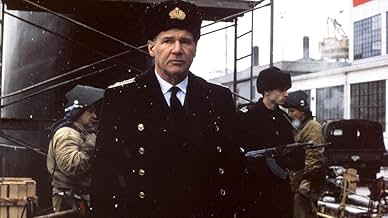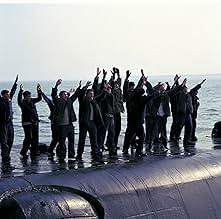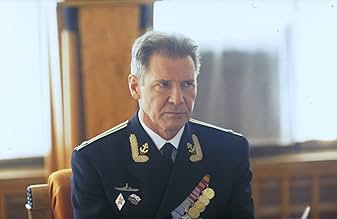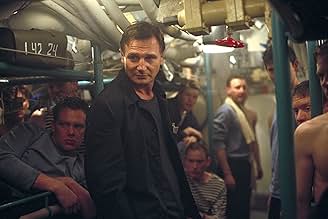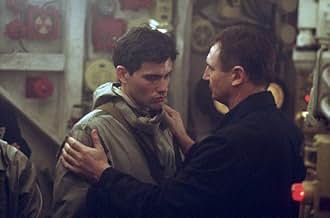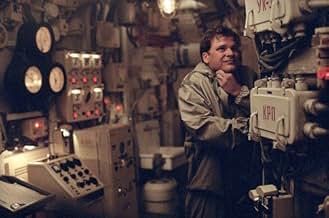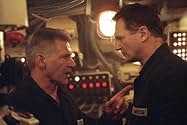When Russia's first nuclear submarine malfunctions on its maiden voyage, the crew must race to save the ship and prevent a nuclear disaster.When Russia's first nuclear submarine malfunctions on its maiden voyage, the crew must race to save the ship and prevent a nuclear disaster.When Russia's first nuclear submarine malfunctions on its maiden voyage, the crew must race to save the ship and prevent a nuclear disaster.
- Awards
- 1 win & 2 nominations
Kris Holden-Ried
- Anton
- (as Kristen Holden-Ried)
- Director
- Writers
- All cast & crew
- Production, box office & more at IMDbPro
Storyline
Did you know
- TriviaThe director and producers of K-19 were the first Western civilians ever allowed inside the Russian naval base at the Kola Peninsula.
- GoofsWhen Alexei Vostrikov arrives to the meeting with the Admirals his rank up to this point is that of Captain Second Rank. However, during the meeting he wears the shoulder insignia of a Captain First Rank. In the next segment when he boards the K-19, he once again is a Captain Second Rank.
- Quotes
Capt. Mikhail Polenin: They'll send you to the Gulag, like your father.
Captain Alexei Vostrikov: Well, it's a family tradition, isn't it?
Featured review
K-19 has a massive cast, especially in the two lead characters of Mikhail Polenin (Liam Neeson) and Alexei Vostrikov (Harrison Ford). My understanding is that Ford wanted to take on a role different than ones he had taken in the past to prevent type-casting, and while he does a good job in his role (as does just about everyone involved), the movie does slip up a little bit by having an almost nonexistent Russian presence in what is supposed to be the story of a Russian submarine.
Comparisons to the far superior Hunt for Red October are inevitable, and it is interesting to note that that movie was also about a Russian submarine but was presented all in English, but it doesn't lose credibility the way K-19 does, probably because it at least maintained a Russian accent, while Ford is speaking an unmistakable American accent and Neeson, well, Neeson is just Neeson and that's always good. He makes a great German but is less convincing as a Russian. I don't know why.
Nevertheless, as a story about an extremely important submarine mission rife with problems the movie succeeds brilliantly. K-19 is basically Russia's protection again nuclear war, which they fear the Americans might start at any moment. They hope to deter attack by showing evidence that they can issue destruction in return, and it is because of this that the sub is commissioned and sent on a mission to the polar ice caps to launch a test missile. There is a great scene where all of the crew and many other people are witnessing the launch of the submarine, and a woman swings a bottle of champagne on a rope to smash against the hull, but it bounces off unbroken. "We're cursed," one of the dismayed crewmen says. That woman must have felt terrible.
There is an immediate rivalry between Polenin, who understands the ship's limitations and wants them corrected before beginning the mission, and Vostrikov, who also understands the ship's limitations but also understands how important the mission is and so outranks Polenin's protests. One of the best things about the movie is that the dramatic action is pushed along by genuine concerns. The movie would have suffered terribly if they were ignoring such important problems with the submarine without good reason.
One of the best things about the movie is that it is able to create so much dramatic tension, even though it takes place during peacetime. There was a huge amount of political tension in the air, but there wasn't a war going on. This is why there is not a lot of concern shown when an American destroyer is sighted near the submarine, because one of the goals of the mission is for the Americans to see what they're doing.
Instead, a small leak aboard the nuclear sub becomes a problem big enough to potentially start a war. Incidentally, one of the crewmen noticed something wrong with one of the dials at least twice before the leak was discovered (once before the ship left port). Had he reported that problem when he first noticed it, he could have saved the lives of everyone who died because of the radiation and prevented the entire thing. At any rate, once the leak is discovered, the options are to abandon ship and surrender the crucial technology to the Americans (a single concession which could dramatically alter the futures of the two nations, and thus rendering it unacceptable), try to repair the reactor without sufficient protection against the radiation, or scuttle the ship (also unacceptable because of the boat's importance).
There is a tense scene where Vostikov orders the ship to dive to almost crush depth, one of the obligatory scenes in submarine movies where the hull creaks and groans and everyone stares at the ceiling, like there's something to see there, and then he orders the ship to ascend at breakneck speed, surfacing through a layer of ice. Vostrikov intends to push the boat and the men to the limit so that they all know what the limit is, but unfortunately it culminates in a hugely disappointing display of digital effects as the ship breaks through the ice in something that looks more like it belongs in a cartoon than a serious film like this (I was reminded of the unfortunate Scrat's efforts to save an acorn from a splitting glacier in Ice Age).
The film requires an extra bit of suspension of disbelief to accept a story about a Russian submarine but without any Russian actors. I'm curious to know how it was received in Russia. I imagine it was a hit, despite the lack of Russian presence in the film, because it illustrates their courage and dedication to their country in the most difficult of times. But nonetheless, it is hugely effective and never lets up once it gets going. The ending strikes me as the part where the most creative liberties were taken with the original true story, leaving you with the feeling of a Hollywood ending imposed on a true story from Russian and American history. But if nothing else, the movie is a fascinating look at how close we came to widespread destruction during one of the most tense times in modern history.
Comparisons to the far superior Hunt for Red October are inevitable, and it is interesting to note that that movie was also about a Russian submarine but was presented all in English, but it doesn't lose credibility the way K-19 does, probably because it at least maintained a Russian accent, while Ford is speaking an unmistakable American accent and Neeson, well, Neeson is just Neeson and that's always good. He makes a great German but is less convincing as a Russian. I don't know why.
Nevertheless, as a story about an extremely important submarine mission rife with problems the movie succeeds brilliantly. K-19 is basically Russia's protection again nuclear war, which they fear the Americans might start at any moment. They hope to deter attack by showing evidence that they can issue destruction in return, and it is because of this that the sub is commissioned and sent on a mission to the polar ice caps to launch a test missile. There is a great scene where all of the crew and many other people are witnessing the launch of the submarine, and a woman swings a bottle of champagne on a rope to smash against the hull, but it bounces off unbroken. "We're cursed," one of the dismayed crewmen says. That woman must have felt terrible.
There is an immediate rivalry between Polenin, who understands the ship's limitations and wants them corrected before beginning the mission, and Vostrikov, who also understands the ship's limitations but also understands how important the mission is and so outranks Polenin's protests. One of the best things about the movie is that the dramatic action is pushed along by genuine concerns. The movie would have suffered terribly if they were ignoring such important problems with the submarine without good reason.
One of the best things about the movie is that it is able to create so much dramatic tension, even though it takes place during peacetime. There was a huge amount of political tension in the air, but there wasn't a war going on. This is why there is not a lot of concern shown when an American destroyer is sighted near the submarine, because one of the goals of the mission is for the Americans to see what they're doing.
Instead, a small leak aboard the nuclear sub becomes a problem big enough to potentially start a war. Incidentally, one of the crewmen noticed something wrong with one of the dials at least twice before the leak was discovered (once before the ship left port). Had he reported that problem when he first noticed it, he could have saved the lives of everyone who died because of the radiation and prevented the entire thing. At any rate, once the leak is discovered, the options are to abandon ship and surrender the crucial technology to the Americans (a single concession which could dramatically alter the futures of the two nations, and thus rendering it unacceptable), try to repair the reactor without sufficient protection against the radiation, or scuttle the ship (also unacceptable because of the boat's importance).
There is a tense scene where Vostikov orders the ship to dive to almost crush depth, one of the obligatory scenes in submarine movies where the hull creaks and groans and everyone stares at the ceiling, like there's something to see there, and then he orders the ship to ascend at breakneck speed, surfacing through a layer of ice. Vostrikov intends to push the boat and the men to the limit so that they all know what the limit is, but unfortunately it culminates in a hugely disappointing display of digital effects as the ship breaks through the ice in something that looks more like it belongs in a cartoon than a serious film like this (I was reminded of the unfortunate Scrat's efforts to save an acorn from a splitting glacier in Ice Age).
The film requires an extra bit of suspension of disbelief to accept a story about a Russian submarine but without any Russian actors. I'm curious to know how it was received in Russia. I imagine it was a hit, despite the lack of Russian presence in the film, because it illustrates their courage and dedication to their country in the most difficult of times. But nonetheless, it is hugely effective and never lets up once it gets going. The ending strikes me as the part where the most creative liberties were taken with the original true story, leaving you with the feeling of a Hollywood ending imposed on a true story from Russian and American history. But if nothing else, the movie is a fascinating look at how close we came to widespread destruction during one of the most tense times in modern history.
- Anonymous_Maxine
- May 9, 2008
- Permalink
- How long is K-19: The Widowmaker?Powered by Alexa
Details
- Release date
- Countries of origin
- Languages
- Also known as
- K*19: The Widowmaker
- Filming locations
- Gimli, Manitoba, Canada(filmed on location in)
- Production companies
- See more company credits at IMDbPro
Box office
- Budget
- $100,000,000 (estimated)
- Gross US & Canada
- $35,168,966
- Opening weekend US & Canada
- $12,778,459
- Jul 21, 2002
- Gross worldwide
- $65,716,126
- Runtime2 hours 18 minutes
- Color
- Sound mix
- Aspect ratio
- 2.39 : 1
Contribute to this page
Suggest an edit or add missing content



